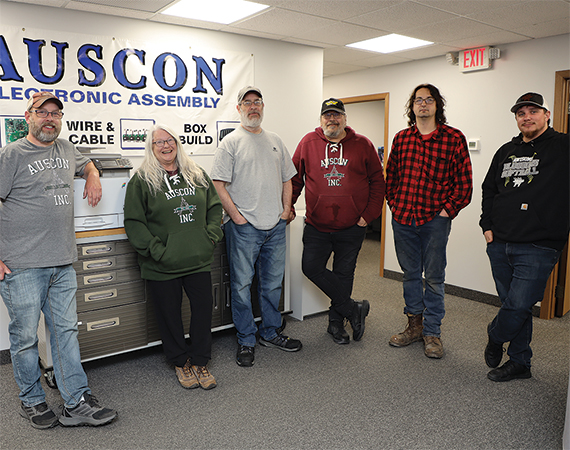It’s easy to see why people love a good “started the business in a garage” story. It reminds us of the value of hard work, perseverance, ingenuity — and an unfailing belief in a dreamer’s vision.
At Auscon, manufacturer of precision electrical components, the company has upped the ante on that particular lore. But to get to the genesis of their story, you have to think smaller than a garage. And one floor lower.
The Austin-based company founded in 1994 began in founder Larry Erickson’s home.
Lori Reed, Auscon’s purchasing and quoting manager, tells the story: “We started in the basement. Then we moved to the garage. And then we started doing things that required more space. Fortunately, Larry had a horse barn that we converted into a shop and moved most of our equipment out there. It was a nice place out there. We had a lot of space for what we were doing. And then we ran out of space.”
Post horse barn, Auscon rents space in Austin’s industrial park. And now the company is taking the next logical step in its evolution: ISO certification.
Like many companies, Auscon started getting requests from clients that wanted Auscon to get ISO certified. Company leadership also recognized that doing so was the best way to take the company — which has customers all over Minnesota, Iowa, Wisconsin, and South Dakota — to the next level.
Auscon has long prided itself on customer service. From its website: “Our people-first strategy means that when you choose to work with us, we put your needs first. You’ll never have to chase us down to return a phone call or email, or struggle to get a meeting when you need it. Every client gets a dedicated project manager who will ensure you receive excellent customer service from start to finish.”
Auscon manufactures custom printed circuit boards, or PCBs. PCBs are a major part of many electronic devices, acting as a base for assembling and connecting components. You’ve probably seen them; PCBs are the futuristic-looking green boards with silver conductive pathways that look a bit like street maps for a big city. Auscon also manufactures custom cable and wire harness assemblies for OEM applications, according to its website, “where off-the-shelf cables simply aren’t an option.”
Much of the company’s process utilizes automation, although Auscon also takes jobs requiring hand tooling.
To maintain their edge in both customer and quality service, Auscon management sought the help of Enterprise Minnesota to guide the company through what it knew could be a complex process.
Auscon Operations Manager Matt Schrom, who came to the company after the first few moves, arrived with a bit of ISO experience. Having witnessed it firsthand, he says he knew better than to have someone in-house attempt navigating the process. And from that experience, he says he knew going through the process and getting certified would make Auscon more efficient and give employees solid, evidenced-backed reasons for changing and, hence, improving the way things are done.
“It’s a quality standard. I’m pretty heavy on quality, and I think Lori is too,” Schrom says. “It helps identify for people that we are willing to put effort into quality for our company and prove to our customers that we want high standards.”
Getting to certification, however, is never an easy or swift process. Auscon took about nine months to get it done, and that was with expert help.
Both Reed and Schrom say there wasn’t much pushback from Auscon’s labor force; pushback can happen when a longtime employee is told the things he or she had been doing for years is getting a justified overhaul. Instead, they say, Auscon’s workers seemed genuinely interested in making improvements to not only enhance the company’s reputation and credibility but also give them more purpose about the importance of their role — an “every spoke is important on this wheel” kind of vibe.
“It really emphasized people paying attention to their job,” Schrom says. “Before it might have been an attitude of, ‘Oh, just send it out.’ Now, with ISO being there, there’s a standard of having the work order and people following the work order.”
Schrom says a culture of abiding ISO norms and rules can help identify and, more importantly, avoid mistakes.
“We are a contract manufacturer that lives off a BOM (bill of materials). So, if it’s in the BOM we follow it,” Schrom says. “But when we’re putting it together and we find something that doesn’t seem right, we’ll contact the company and, in most cases, they’ll have to change the BOM. Not only did ISO improve the process of the material going through, it also improved the other company’s quality of the product because they discovered a mistake in their design.”
Reed, who has been with the company for nearly 30 years, said finally getting Auscon’s ISO certification was a big deal. It was a morale boost, she says, for both management and staff. Getting over that hurdle, she says, could mean big things for the company’s future.
“We knew we had to do it,” Reed says. “It was something that, in order for us to grow even bigger — which we plan to do — we had to go through this process. This will help us get more clients, more customers, because a lot of places look for that.”
Return to the Summer 2025 issue of Enterprise Minnesota® magazine.


